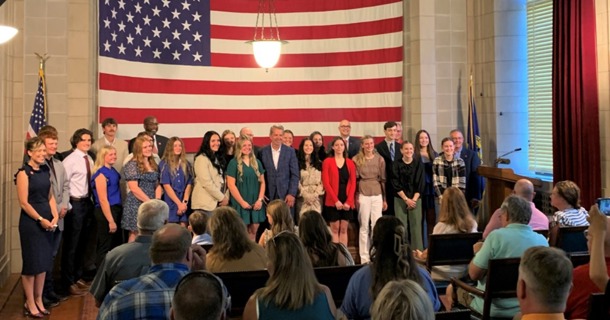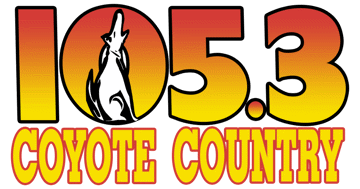Gov. Pillen and University Leaders Recognize Inaugural Elite 11 Scholarship Recipients

LINCOLN, NE – Today, Governor Jim Pillen joined leaders from the University of Nebraska in recognizing the first cohort of students to qualify for a uniquely designed program aimed at increasing the number production animal veterinarians in Nebraska. Those veterinarians specialize in working with farmers and ranchers who raise cattle, swine, sheep and other forms of livestock and poultry.
Gov. Pillen and university leadership announced the creation of the Nebraska Elite 11 Veterinarian Program in February, and the first applications were accepted in March. Nineteen students are currently enrolled. Each one receives the Nebraska Production Animal Health Scholarship, which covers 50% of their tuition for the first two years of study in the College of Agricultural Sciences and Natural Resources at the University of Nebraska – Lincoln (UNL).
“These students are embarking on a challenging, yet hugely rewarding career path,” said Gov. Pillen, who also received his doctorate in veterinary medicine. “The demand for production animal veterinarians is high. This program is a leader in the United States. It will provide students the top-level training they need, and it will set them on a career path that will allow them to continue practicing, right here in Nebraska.”
Up to 25 students can take advantage of the initial scholarship. Following their second year of study, 13 are chosen for a continuation scholarship that covers 100% of their tuition during their third and fourth years. From there, the Elite 11 are selected from UNL’s Professional Program in Veterinary Medicine (PPVM) to have all tuition and fees paid for while they attend UNL’s dual Doctor of Veterinary Medicine (DVM) program with Iowa State University (ISU).
"The Elite 11 program is creating exactly the kind of impact we hoped it would,” said Dr. Jeffrey Gold, president, University of Nebraska. “I'm so pleased to welcome this group of talented young women and men to the University of Nebraska, and I know they will achieve great things for Nebraska agriculture and the veterinary industry in the years to come. I want to thank Dean Tiffany Heng-Moss for her vision on this important effort and Governor Pillen for his leadership and support every step of the way."
One of the key requirements for consideration and participation in the Elite 11 program is that applicants must be residents of Nebraska. They must also demonstrate a strong interest in production animal health and a commitment to major in animal or veterinary science.
“I am thrilled to welcome these 19 scholarship recipients to the College of Agricultural Sciences and Natural Resources at UNL,” said Dean Tiffany Heng-Moss of the College of Agricultural Sciences and Natural Resources. “These outstanding students had their choice of colleges, but I’m delighted to be able to say that all have committed to staying in our state both during college and after. This is a big win for Nebraska, our veterinary workforce, and the future of agriculture in our state.”
Mike Boehm, NU vice president and Harlan vice chancellor for UNL’s Institute of Agriculture and Natural Resources, also offered his congratulations to the inaugural students.
“It’s always a joy to be in room filled with so much passion for our state and its agriculture industry, its natural resources and the hardworking people that contribute to our state’s success,” said Boehm. “I’m grateful to these students for their commitment to Nebraska, to their families and communities for instilling in them the values that got them here today, and to state leaders, including Gov. Pillen, for championing this critical program.”
UNL Chancellor, Dr. Rodney Bennett, pointed to the program’s goal of meeting critical needs in a state for which the livestock industry contributes more than $6 billion annually to the economy.
"The Elite 11 program exemplifies the University of Nebraska–Lincoln’s dedication to academic excellence and community impact. By developing these exceptional students into future veterinarians, we are addressing a crucial need in the agricultural sector and ensuring that our university remains a leader in nurturing talent that supports Nebraska communities. This program is a reflection of our commitment to empowering students and advancing the welfare of our state."
As part of their participation in the Elite 11 program and upon graduation, students agree to stay in Nebraska for eight years as practicing production animal veterinarians or they must pay back their school scholarship. The application period for the next cohort of students will be announced this fall.
Listed alphabetically by hometown, the 19 students recognized in today’s program include:
Dix: Hannah Keilian
Dodge: Meg Anderson
Hastings: Lynsie Lancaster
Hershey: Peyton Fisher
Hooper: Klayton Hilbers
Keystone: Presley Nowak
Lincoln: Alannah Crabtree
Maywood: Haydn Farr
Naponee: Addison Pool
North Platte: Haylie Hoatson
O’Neill: Claire Stauth
Oakland: Bailey Denton
Palmyra: Jacob Wood
Phillips: Jack Steenson
St. Libory: Chloe Scheer
Weeping Water: Brooklyn Ahrens
Wellfleet: Chase Martin
West Point: Sydney Hutchinson
York: Emma Snider
